Items filtered by date: October 2024
Risk Factors for Stress Fractures
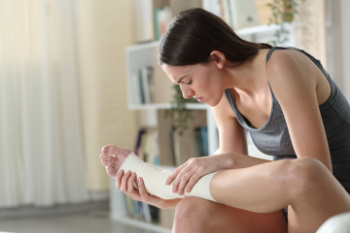
Foot stress fractures are hairline cracks in the bones often caused by repetitive strain. Several risk factors can increase the likelihood of developing stress fractures, especially in the feet. People who participate in high-impact activities, such as running, dancing, or gymnastics, face a higher risk of stress fractures from the repeated pressure and pounding on their feet. Women, particularly those experiencing menstrual irregularities, may be more prone to fractures due to lower bone density. Conditions like osteoporosis or insufficient intake of vitamin D and calcium can further weaken bones and increase the risk. Foot structure issues, such as high arches or flat feet, can also lead to stress fractures, as well as wearing poor footwear or sudden changes in activity surfaces. Podiatrists play a key role in diagnosing and managing foot stress fractures. This foot doctor may use imaging techniques such as MRI scans to confirm the injury. If you have foot pain that may indicate a stress fracture, it is suggested that you schedule an appointment with a podiatrist for an exam and treatment.
Stress fractures occur when there is a tiny crack within a bone. To learn more, contact one our of podiatrists from The Foot and Ankle Specialists. Our doctors can provide the care you need to keep you pain free and on your feet.
How Are They Caused?
Stress fractures are the result of repetitive force being placed on the bone. Since the lower leg and feet often carry most of the body’s weight, stress fractures are likely to occur in these areas. If you rush into a new exercise, you are more likely to develop a stress fracture since you are starting too much, too soon. Pain resulting from stress fractures may go unnoticed at first, however it may start to worsen over time.
Risk Factors
- Gender – They are more commonly found in women compared to men.
- Foot Problems – People with unusual arches in their feet are more likely to develop stress fractures.
- Certain Sports – Dancers, gymnasts, tennis players, runners, and basketball players are more likely to develop stress fractures.
- Lack of Nutrients – A lack of vitamin D and calcium may weaken the bones and make you more prone to stress fractures
- Weak Bones – Osteoporosis can weaken the bones therefore resulting in stress fractures
Stress fractures do not always heal properly, so it is important that you seek help from a podiatrist if you suspect you may have one. Ignoring your stress fracture may cause it to worsen, and you may develop chronic pain as well as additional fractures.
If you have any questions, please feel free to contact our offices located in Houston and Deer Park, TX . We offer the newest diagnostic and treatment technologies for all your foot care needs.
Arthritis Can Cause Pain in the Feet and Ankles
Top Causes of Ankle Pain
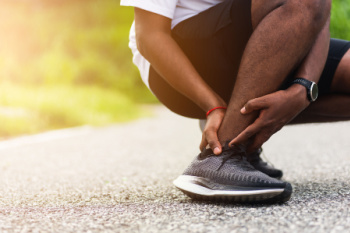
Ankle pain can arise from various causes that affect your mobility and quality of life. Common sources of ankle pain include sprains, strains, fractures, and conditions like osteoarthritis or rheumatoid arthritis. An ankle sprain occurs when the ligaments, which connect bones, are overstretched or torn. A strain involves damage to muscles or tendons in the ankle joint. Fractures are breaks in the bone, often resulting from trauma. Other causes, like gout or infections, can lead to severe swelling and pain. Flatfoot disorder and rheumatoid arthritis are also linked to ankle pain, often worsening over time. Managing ankle pain early is important to avoid further injury. A podiatrist can diagnose these conditions through physical exams and imaging studies, followed by a treatment plan to reduce pain and prevent complications. If you are suffering from ankle pain, it is suggested that you schedule an appointment with a podiatrist for a diagnosis and treatment.
Ankle pain can be caused by a number of problems and may be potentially serious. If you have ankle pain, consult with one our of podiatrists from The Foot and Ankle Specialists. Our doctors will assess your condition and provide you with quality foot and ankle treatment.
Ankle pain is any condition that causes pain in the ankle. Due to the fact that the ankle consists of tendons, muscles, bones, and ligaments, ankle pain can come from a number of different conditions.
Causes
The most common causes of ankle pain include:
- Types of arthritis (rheumatoid, osteoarthritis, and gout)
- Ankle sprains
- Broken ankles
- Achilles tendonitis
- Achilles tendon rupture
- Stress fractures
- Bursitis
- Tarsal tunnel syndrome
- Plantar fasciitis
Symptoms
Symptoms of ankle injury vary based upon the condition. Pain may include general pain and discomfort, swelling, aching, redness, bruising, burning or stabbing sensations, and/or loss of sensation.
Diagnosis
Due to the wide variety of potential causes of ankle pain, podiatrists will utilize a number of different methods to properly diagnose ankle pain. This can include asking for personal and family medical histories and of any recent injuries. Further diagnosis may include sensation tests, a physical examination, and potentially x-rays or other imaging tests.
Treatment
Just as the range of causes varies widely, so do treatments. Some more common treatments are rest, ice packs, keeping pressure off the foot, orthotics and braces, medication for inflammation and pain, and surgery.
If you have any questions, please feel free to contact our offices located in Houston and Deer Park, TX . We offer the newest diagnostic and treatment technologies for all your foot care needs.
Risks of Falling Outside the Home
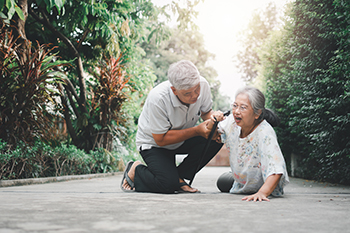
Falling outside the home can pose a significant risk, especially for older adults. Falls outside the home can be caused by uneven terrain, slippery surfaces, or crowded areas. Parks, parking lots, and public staircases are common spots where falls may occur, leading to serious injuries like broken bones. Footwear choices play a vital role in preventing falls. Your shoes should offer solid support, fit properly, and have non-slip soles to provide stability. Balance issues, lower extremity weakness, or joint pain can also increase the risk of falls outside the home. A podiatrist can assess these factors, recommend supportive footwear, and suggest custom orthotics to improve balance. This foot doctor can address underlying foot conditions that might compromise your stability or suggest exercises and assistive devices to improve balance. If you have injured your foot or ankle from falling, it is suggested that you schedule an appointment with a podiatrist for appropriate treatment methods.
Preventing falls among the elderly is very important. If you are older and have fallen or fear that you are prone to falling, consult with one our of podiatrists from The Foot and Ankle Specialists. Our doctors will assess your condition and provide you with quality advice and care.
Every 11 seconds, an elderly American is being treated in an emergency room for a fall related injury. Falls are the leading cause of head and hip injuries for those 65 and older. Due to decreases in strength, balance, senses, and lack of awareness, elderly persons are very susceptible to falling. Thankfully, there are a number of things older persons can do to prevent falls.
How to Prevent Falls
Some effective methods that older persons can do to prevent falls include:
- Enrolling in strength and balance exercise program to increase balance and strength
- Periodically having your sight and hearing checked
- Discuss any medications you have with a doctor to see if it increases the risk of falling
- Clearing the house of falling hazards and installing devices like grab bars and railings
- Utilizing a walker or cane
- Wearing shoes that provide good support and cushioning
- Talking to family members about falling and increasing awareness
Falling can be a traumatic and embarrassing experience for elderly persons; this can make them less willing to leave the house, and less willing to talk to someone about their fears of falling. Doing such things, however, will increase the likelihood of tripping or losing one’s balance. Knowing the causes of falling and how to prevent them is the best way to mitigate the risk of serious injury.
If you have any questions, please feel free to contact our offices located in Houston and Deer Park, TX . We offer the newest diagnostic and treatment technologies for all your foot care needs.
Recognizing Signs of Gout in the Feet
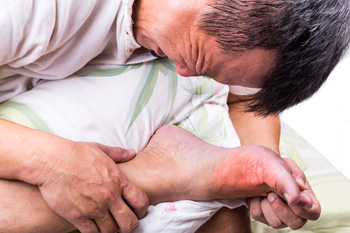
Gout is a form of arthritis that can cause significant discomfort, particularly in the feet. One of the most common signs is intense pain, often occurring suddenly and affecting the big toe, although it can impact other joints as well. Inflammation is another key indicator, with the affected area becoming swollen and tender to the touch. Additionally, skin discoloration may occur, with the skin appearing red or purplish around the joint. Some individuals may also experience itchy, peeling skin, which can add further discomfort. If you have pain in your big toe, it may be gout and may lead to one or more gout attacks. If this applies to you, it is strongly suggested that you are under the care of a podiatrist who can accurately diagnose gout and offer you relief and management tips.
Gout is a foot condition that requires certain treatment and care. If you are seeking treatment, contact one our of podiatrists from The Foot and Ankle Specialists. Our doctors will treat your foot and ankle needs.
What Is Gout?
Gout is a type of arthritis caused by a buildup of uric acid in the bloodstream. It often develops in the foot, especially the big toe area, although it can manifest in other parts of the body as well. Gout can make walking and standing very painful and is especially common in diabetics and the obese.
People typically get gout because of a poor diet. Genetic predisposition is also a factor. The children of parents who have had gout frequently have a chance of developing it themselves.
Gout can easily be identified by redness and inflammation of the big toe and the surrounding areas of the foot. Other symptoms include extreme fatigue, joint pain, and running high fevers. Sometimes corticosteroid drugs can be prescribed to treat gout, but the best way to combat this disease is to get more exercise and eat a better diet.
If you have any questions please feel free to contact our offices located in Houston and Deer Park, TX . We offer the newest diagnostic and treatment technologies for all your foot and ankle needs.
How to Manage an Ingrown Toenail
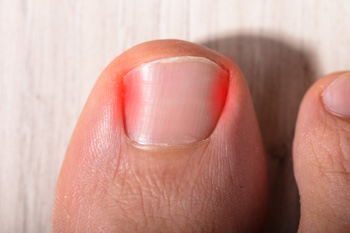
Ingrown toenails occur when the edge of a toenail grows into the surrounding skin, causing pain, swelling, and sometimes infection. The big toe is most commonly affected. Causes include improper nail trimming, wearing tight or ill-fitting shoes, injury to the toenail, or genetic predisposition. Symptoms of an ingrown toenail include redness, swelling, pain, and tenderness along the side of the nail. If left untreated, the area can become infected, leading to pus, warmth, and increased pain. If you have toe pain and notice symptoms of an ingrown toenail, it is suggested that you visit a podiatrist who can guide you toward effective treatment, which may include partial nail removal.
Ingrown toenails can become painful if they are not treated properly. For more information about ingrown toenails, contact one our of podiatrists of The Foot and Ankle Specialists. Our doctors can provide the care you need to keep you pain-free and on your feet.
Ingrown Toenails
Ingrown toenails occur when a toenail grows sideways into the bed of the nail, causing pain, swelling, and possibly infection.
Causes
- Bacterial infections
- Improper nail cutting such as cutting it too short or not straight across
- Trauma to the toe, such as stubbing, which causes the nail to grow back irregularly
- Ill-fitting shoes that bunch the toes too close together
- Genetic predisposition
Prevention
Because ingrown toenails are not something found outside of shoe-wearing cultures, going barefoot as often as possible will decrease the likeliness of developing ingrown toenails. Wearing proper fitting shoes and using proper cutting techniques will also help decrease your risk of developing ingrown toenails.
Treatment
Ingrown toenails are a very treatable foot condition. In minor cases, soaking the affected area in salt or antibacterial soaps will not only help with the ingrown nail itself, but also help prevent any infections from occurring. In more severe cases, surgery is an option. In either case, speaking to your podiatrist about this condition will help you get a better understanding of specific treatment options that are right for you.
If you have any questions please feel free to contact our offices located in Houston and Deer Park, TX . We offer the newest diagnostic and treatment technologies for all your foot and ankle needs.

